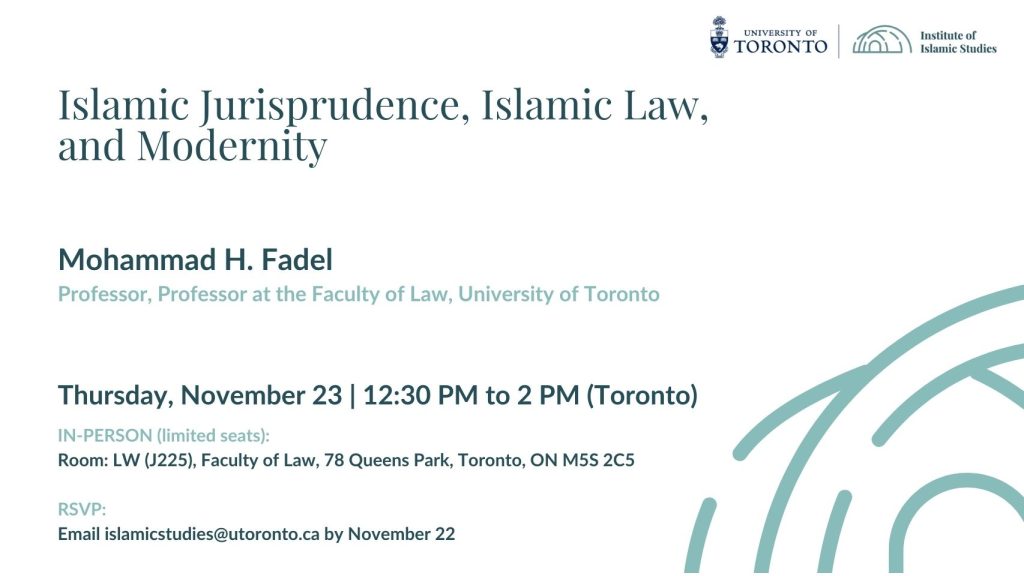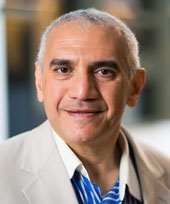Book Talk: Islamic Jurisprudence, Islamic Law, and Modernity by (Mohammad H. Fadel)
Mohammad H. Fadel will present his new book at the Faculty of Law on Thursday, November 23rd at 12:30 PM.

Description:
From the Lockwood Press website:
Mohammad Fadel’s scholarship on Islamic law and legal history ranges from medieval institutions and the history of Islamic legal interpretation to urgent problems relating to the modern reception and re-assessment of Islamic legal doctrine. Fadel’s intellectual concerns focus primarily on the compatibility of the Islamic legal tradition with modern liberal political arrangements, but in his research and writing he also delves into the realm of premodern Islamic legal thought and institutions. His Rawlsian approach leads him to a political reading of the Islamic legal tradition, which he accomplishes by teasing out jurists’ assumptions about politics, economics, and the domestic sphere.
Fadel’s readings of Islamic legal sources suggest that Islamic law remains relevant to a society in which legitimate disagreements over law and morality seem intractable. At the same time, from the Rawlsian perspective he adopts, Fadel reminds us that premodern Muslim jurists formulated Islamic law also under conditions of substantial controversy over matters of law and morality, as well as over questions of religion, politics, theology, and metaphysics.
The studies gathered together in this volume adroitly illustrate Fadel’s interest in Islamic law as a domain of Islamic political thought and as a framework that might be deployed in today’s pluralistic and secularized societies.
In anticipation of his book talk on November 23rd (link to register) we sat down with Professor Fadel to better understand his work and its significance.
Q. What initially drew you to the study of Islamic law and its intersection with modern political systems?
A. I think it was just a function of growing up as an American, and just my interest. And trying to understand my place as an American and as a Muslim and as a citizen of democracy. So I was just compelled to investigate these issues…on a more systematic basis. A lot of my work arises out of the kinds of questions that lots of people have growing up in the West. So I would just say that I’ve spent a lot more time thinking about them, a lot more systematically. But the questions are relatively common.
Q. What inspired this book and what key themes do you intend to convey?
A. It’s not really a new book; it’s an anthology of previously published work, and basically what motivated me was that the publishers edited a series on Islamic studies…, They approached me and said we would really like to publish an anthology of some of your articles. It was an opportunity for me to prepare a volume with a selection of my writings and have an opportunity for me to write a little bit about my scholarship in general. It gave me an opportunity to write …my own reflections on my own scholarly career. …It was …difficult because there are space limitations. I could only include a relatively small number of my published works, and I actually couldn’t figure out what to include so I just dedicated that task to my research assistant. I asked my research assistant to come up with the list of articles that he thought should be included in the anthology, and so I essentially deferred to that. I thought that was … a reasonable way to proceed because I thought the perspective of a student is…useful because the student…looks at my publications and thinks, ‘oh, these are the things that are of interest.’ Finally it allows me to present my work in one source because most of my scholarly career has been devoted to writing articles, not monographs. A couple of articles which I consider relatively interesting were published in otherwise obscure fora and so I was again pleased that the student selected some pieces that weren’t as well known. By placing them in this volume, I think they will get more attention than they would have otherwise received. Those are the main motives behind it.
Q. What advice would you offer to students and researchers studying the interplay between tradition and modernity in Islamic legal system?
A. It’s really important to work on problems that you think are really important to you, and to try to look at that problem from very diverse perspectives. First of all, I think it helps you produce interesting scholarship. And then also make sure that you maintain a long term commitment to your scholarship by working on questions that you personally find compelling and interesting so you don’t get bored. You’re constantly working because you know your motivations are coming from yourself, from inside. And you’re writing to satisfy yourself.
When I was interviewing for teaching jobs, sometimes a common question I would receive is who is your audience? And I would say, well, ultimately my audience is me. I’m writing to answer questions that I’ve posed to myself, and I’m trying to seek satisfactory answers for. And if others find them to be interesting or compelling, or even crazy, but serious enough to warrant a response, then that’s great. But I … view those as secondary questions or a secondary audience. It’s me who is the first audience.
If you want to have a successful academic career, you need to come up with questions that you yourself want answers for and work on those questions, and then hopefully they will be of interest to others…It is plausible that other people will find the things that you’re working on to be interesting too, but it’s a mistake to work on things because you think other people will find it interesting. Find what you think is interesting. Work on what motivates you. And if you are really interested in a problem, you will make other people see why.
Q. How do you see the role of academic research in promoting cross cultural understanding and fostering dialogue on complex topics like these?
A. The most important role academics have in any field, including Islamic studies, is maintaining high standards of excellence and research. As I said, if you write an interesting work, others are likely to find it interesting too. And so the only way to do that is to have a high regard for the standards of excellence that academic scholarship requires. And by fulfilling that obligation, you create the conditions for meaningful intercultural exchange…The role of scholars is to produce works that satisfy criteria of excellence as a scholarly community understands it, and when that is done, there’s a great likelihood of actually furthering goals like humanistic exchange, et cetera. But it does so incidentally to the mission of being an excellent scholar.
Q. When considering the title of your book, how do you address the relationship between Islamic jurisprudence and modernity?
A. I’m not really sure if I have the answers to the questions of compatibility or the lack of compatibility, that’s ultimately the sort of decisions or conclusions that individuals have to reach on their own. But the title is supposed to be an allusion…to the motives behind my writing. I write as a modern Muslim… living in the modern world, who appreciates modernity, and who is trying to situate himself as a Muslim—as a modern Muslim—which requires not only understanding the circumstances of his own life, but also how to understand it with his own cultural and historical past. And the way my scholarship does that is by looking at jurisprudence and law. From the lens of being modern, how can the modern Muslim relate to his present and his past? That is the question that I think motivates my scholarship and that was the point of the title. And if I could just say something about the cover. The cover was chosen deliberately….We wanted the cover to convey a nod to the Muslim past, but at the same time, point to the future. So it’s a painting of a scene from the Alhambra, the iconic palace in Granada. But it’s in, you know, an impressionist style. So, it’s at the same time one foot in the past, but also firmly grounded in the present.
Q. What key takeaways do you hope readers gain from your book’s diverse topics?
A. I hope readers first realize that there is a certain kind of unity to my writing which might not appear obvious if you just look at my bibliography. You might think that …this guy flies all over the map writing all these on all these different topics. But I think if you read my book, particularly the introduction, you will realize that although the different articles that I published ostensibly deal with different questions…there is a certain kind of unity and approach that unifies them …. Secondly, I also hope that users appreciate my method of analysis, which is based on close readings of substantive legal doctrines and trying to unpack the kind of implicit norms or …higher order commitments and norms that we can learn or deduce. From focusing on otherwise mundane rules we can observe the political as a domain that’s highly connected to the practical. And so, I think the proper way of thinking politically is to think through the practical as opposed to thinking sort of metaphysically. And so, I’m trying to show how law itself can be a source of political thinking.
You can access his articles on the Social Science Research Network (SSRN)Additional publications are also available on Shanfaraa and his faculty page.
Bio:

Mohammad H. Fadel is Full Professor at the University of Toronto Faculty of Law, which he joined in January 2006. From 2006 to 2016, he was Canada Research Chair for the Law and Economics of Islamic Law. Professor Fadel wrote his PhD dissertation on legal process in medieval Islamic law at the University of Chicago, and received his JD from the University of Virginia School of Law.